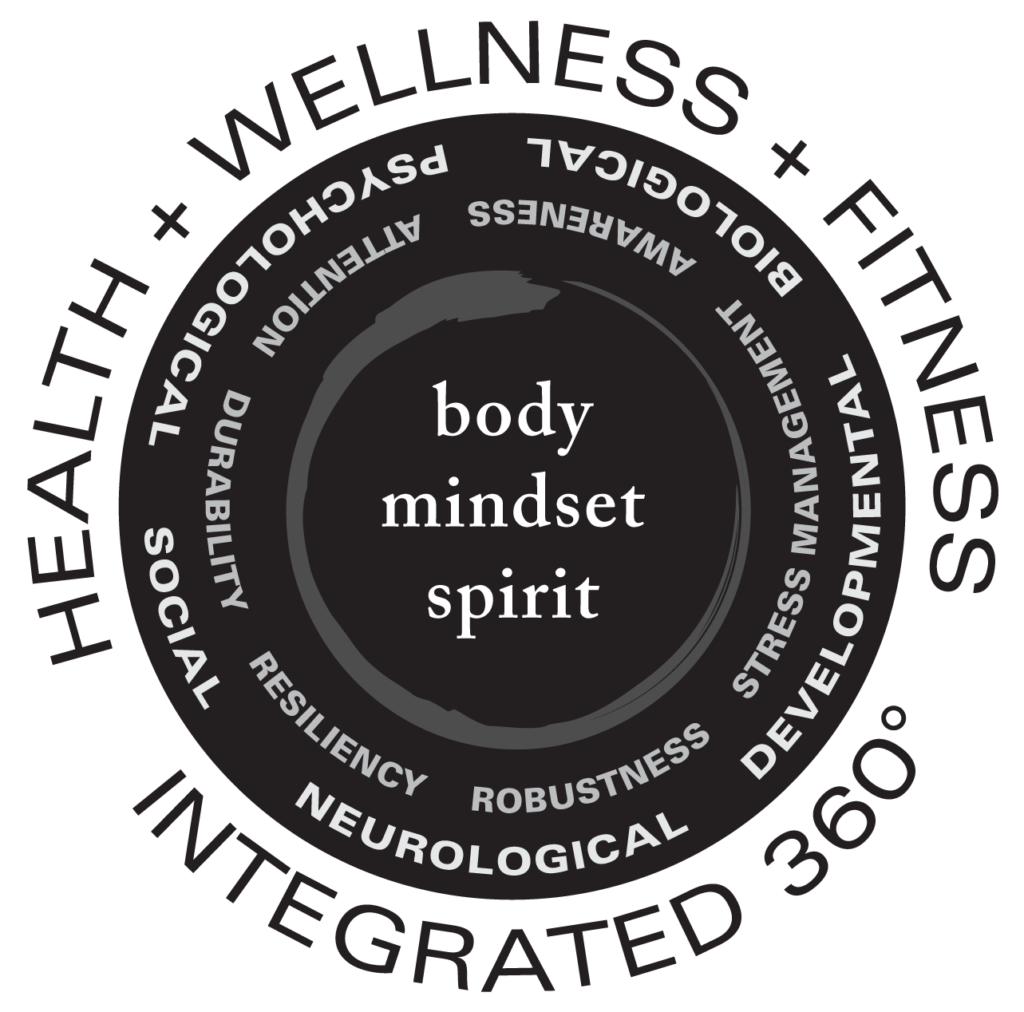Integrative Wellness and Movement (IWM): Philosophy

Integrated 360° approach. Whole-person health, wellness, and fitness includes identifying and assessing the domains of influence (e.g. work, environment, finance, school, social circles, etc.) while considering their neurological, developmental, and biopsychosocial impact on an individual over time. The Integrated 360° is a multi-disciplinary and “team” approach (e.g. medical and allied health professionals) to address an individual’s health concerns, treat the root cause, and provide evidence-guided education on health, wellness, and fitness.
The whole is greater than the sum of its parts. The human body is a complex, dynamic, integrated tensegrity system—all the elements function together as one system. The human body is multidimensional and multifactorial—no one element works in complete isolation of other elements. Therefore, when one area of the body is functioning suboptimally, it affects the other areas of the body as well.
Barring traumatic events, an individual’s health-landscape is developed over time (cumulative). Choices, actions, behaviors, habits, and etc. shape and form the individual’s current health-landscape.
An individual’s overall well-being is comprised of health, wellness, and fitness (as defined below).
Health is “a state of complete physical, mental and social well-being and not merely the absence of disease or infirmity” according to WHO (1948).
Wellness, according to the National Wellness Institute or NWI (n.d.) encompasses 6 dimensions: occupational, physical, social, intellectual, spiritual, and emotional. NWI (n.d.) defined wellness as: “a conscious, self-directed and evolving process of achieving full potential; multidimensional and holistic, encompassing lifestyle, mental and spiritual well-being, and the environment; positive and affirming” (para. 4).
Fitness refers to the individual’s capacity to function in task-related performance (e.g. athletic endeavor, work, school, activities of daily living, etc.), functional capacity.
The body-mindset-spirit connection is key. Listen to your body! You cannot outsmart your body. Learn to listen to what your body needs.
Stress management. Stress and change are inevitable. What is important is how an individual responds, adapts, and manages stress and change. Stress can be good (eustress) and bad (distress). An individual needs enough eustress to grow and develop. Bad stress that remains unmanaged will promote maladaptive consequences in other areas of the individual’s life.
Sustainability. In order to change one’s health-landscape, one must gradually learn to make new choices to promote more healthful behaviors. One must learn new self-management techniques in order to make good things “stick”. Mindset and spirit can influence a series of strategic sustainable changes leading to positive and transformative adaptations.
Recovery-first. Our training focus is a “recovery-first” approach promoting durability, resiliency, robustness, and positive adaptations to stress/adversity. Adequate recovery of mindset-body-spirit is essential to physical, mental, and emotional health-wellness.
Readiness is a state of being prepared for whatever circumstance/situation/task/performance than an individual might anticipate. I believe readiness is the optimal state. There is no “prepping” or “ramping up” time; you are ready-to-go.
Fundamental movement competencies. To maximize one’s potential, one must achieve a fundamental level of movement competency—good movement patterning and moving well. Fundamental movement competencies are important through all stages of development, from infancy to adulthood. These basic competencies come before building skill.
Nutrition. Good nutrition meets the daily demands of the body, supports the body’s functions, supports recovery, and is an essential component in health-wellness-fitness. Nutritional needs are specific to a person. Nutritional needs are dynamic and vary throughout a person’s lifetime. Your nutritional requirements today may be different a week, a month, or a year from now. It all depends on what you are going through in life. Intake as many whole, minimally processed foods as possible; supplement minimally.
Naturopathic approach. This is NOT to be confused with naturopathic medicine as I am NOT a naturopathic physician. However, I do believe in keeping things simpler and more natural as a first option as long as that is appropriate to the level of “urgency”. I believe that through proper nutrition and exercise, you can do great things for your body. Nature is smarter than “technology”. When possible, I believe in first presenting options that are more natural (and less toxic) than bioengineered or technology-based. However, both methodologies can work together to achieve optimal results—a very complementary practice.
Cultivate-Nurture-Grow. At IWM, we vigilantly seek to uplift and enhance the training of the mind, body, and spirit through lifelong education and discovering healthy, ethical, transformative choices. We cultivate, nurture, and grow people. We believe in the power of the human spirit, our ability to grow the kind of inner character that can move mountains, and the kindness and generosity we all possess.
In fitness and health, for that is true wealth,
Shirley Chung, M.S. Kinesiology, FMS Level 1 Certified, Pn2, NASM CPT-CES
Email integrativewellnessandmovement@gmail.com for my CV.
References
National Wellness Institute (NWI). (n.d.). The six dimensions of wellness. Retrieved from http://www.nationalwellness.org/?page=Six_Dimensions
World Health Organization (WHO). (1948, April 7). WHO definition of health. Retrieved from https://www.who.int/about/mission/en/
